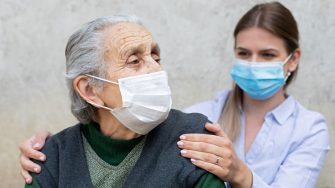
In a commentary published in International Psychogeriatrics in June 2020, UNSW Ageing Futures Institute members Professor Carmelle Peisah and Professor Andrew Byrnes have called upon their clinical colleagues to bring a human rights approach to advocacy and care for their older mental health and dementia patients during the COVID-19 pandemic and beyond.
Professor Peisah is an old age psychiatrist in the Faculty of Medicine at UNSW and Professor Byrnes is a human rights lawyer and advocate from the UNSW Faculty of Law and the Australian Human Rights Institute. Together with their international colleagues in ageing, aged care and law, they have examined the lack of focus on human rights that has been seen around the world in relation to the care of older patients both before and during the pandemic.
In their commentary the team acknowledge the incredibly challenging and rapidly changing circumstances of health care during the pandemic. However, they also highlight many of the distressing scenarios being faced by older patients, their loved ones and their medical teams, including some of the discourse that has been observed around the triage and distribution of health care in relation to older people
They note that the pandemic has highlighted an environment in which ageism, mentalism (discrimination based on mental health) and the neglect of the human rights of older people was already prevalent.
The team make a series of recommendations where opportunities for human rights advocacy can be seized upon during everyday medical decision-making and clinical practice. They suggest the following active measures that can be adopted by clinicians to promote human rights of older people:
- building reference to autonomy, relationships and equitable access to health care into the policies of health and care settings;
- keeping in mind human rights when doing medico-legal work including Guardianship and Administration applications;
- highlighting the importance of free and informed consent, autonomy and supported decision making in medical decision-making, especially around end of life through the active pursuit of advance care planning;
- giving voice to the will and preferences of older people in broader health care policies regarding their rights in residential care settings during the pandemic, particularly in relation to segregation;
- adoption of an anti-ageist culture that ensures that categorisation and treatment of patients is not based solely on chronological age.
They acknowledge that the best interests of patients and their families remain important in these clinical environments where the risk of infection is high, however equally, autonomy and the right to the expression of will and preferences remain important for all, regardless of age or disability. An understanding and application of human rights will allow consideration of other important goals of autonomy, connectedness, equal treatment, and dignity.
The open access article with the full list of recommendations can be found here
Watch a recording of a webinar given by Professor Peisah for the International Psychogeriatric Association (IPA) on 23rd May 2020 - Older persons’ human rights and the COVID pandemic: are they compatible?: COVID-19, social distancing and its impact on social and mental health of the elderly population.
Join Professors Peisah and Byrnes and their international colleagues for Capacity Australia’s First Live International Debate: Should Nursing Homes be Abolished: the battle of the Professors, on the 2nd September, 2020 (1st September Northern Hemisphere). SEE here to Register
